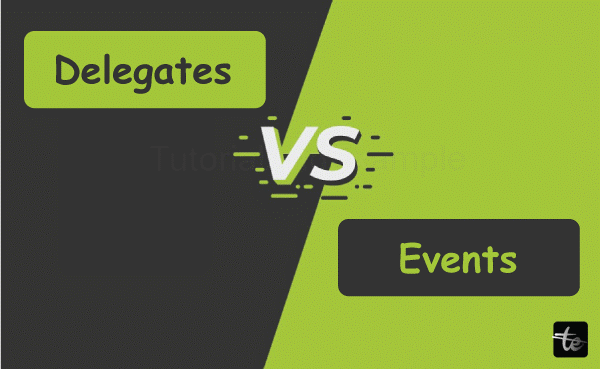Difference between delegates and events in C#
C# is a powerful programming language that provides developers with various features and constructs. The delegates and events are two essential concepts in C#, which facilitate communication and interaction between different parts of an application. While delegates and events are related, they have distinct roles, and understanding their differences is crucial for writing efficient and maintainable code. In this article, we will discuss the difference between the delegates and events in C#. But before discussing the differences, we have to know about the delegates and events in C#.
Delegates: The Foundation of Event Handling
In C#, a delegate is a type that represents a method signature. It allows developers to define and reference methods dynamically, providing a way to encapsulate and pass methods as parameters. Delegates are particularly useful for implementing callback mechanisms and enabling loose coupling between different components of an application.
One notable feature of delegates is multicast, which allows multiple methods to be assigned to a single delegate instance. It means that all the assigned methods are called in a specific order when the delegate is invoked. Developers can use predefined delegates like Action and Func or create custom delegates to match the required method signature.
To illustrate the concept of delegates, consider the following example:
Code:
using System;
using System.Collections.Generic;
class Program
{
// define a method that returns the sum of two int numbers
static int calculated(int a, int b)
{
return a * b;
}
//Define a delegate
public delegate int myDelegate(int num1, int num2);
static void Main()
{
//Create an example of the delegate by passing the method name
myDelegate mul = new myDelegate(calculated);
// calling calculated() using delegate
int result = mul(8, 7);
Console.WriteLine(result);
}
}
Output:
56
Events: Specialized Constructs for Event-Driven Programming
Events method builds upon the concept of delegates and provides a higher level of abstraction for implementing event-driven programming. They offer a safer and more controlled way of subscribing and unsubscribing from events, ensuring encapsulation and preserving the integrity of the event's invocation list.
In C#, events are declared using the event keyword and are typically associated with a delegate type. The delegate type defines the signature of the methods that can be subscribed to the event. Once an event is defined, it can be raised to notify all the registered subscribers that a specific action or state change has occurred.
To better understand events, let's examine an example:
Code:
using System;
namespace Delegates
{
public delegate void DelEventHandler();
class EventProgram
{
public static event DelEventHandler add;
static void Main(string[] args)
{
add += new DelEventHandler(India);
add += new DelEventHandler(Britain);
add += new DelEventHandler(Russia);
add.Invoke();
Console.ReadLine();
}
static void India()
{
Console.WriteLine("India");
}
static void Britain()
{
Console.WriteLine("Britain");
}
static void Russia()
{
Console.WriteLine("Russia");
}
}
}
Output:
India
Britain
Russia
Key differences between Delegates and Events
There are various key differences between delegates and events. Some main differences between delegates and events are as follows:

Delegates:
- Delegates are type-safe function pointers that allow methods to be referenced and invoked dynamically.
- They provide flexibility by allowing multiple methods to be assigned to a single delegate instance.
- Delegates facilitate callback mechanisms, enabling loose coupling and decoupling of code.
- They can create custom delegates or utilize predefined delegates like Action and Func.
- Delegates are suitable for scenarios where direct method invocation or callback mechanisms are needed.
Events:
- Events build upon delegates and provide a higher level of abstraction for implementing event-driven programming.
- They are declared using the event keyword and are typically associated with a delegate type.
- Events ensure controlled subscription and unsubscription to event handlers.
- They encapsulate the invocation of methods and protect the integrity of the event's invocation list.
- Events are typically raised from within the declaring class, notifying all registered subscribers.
- Events are widely used in scenarios where components need to be notified about specific actions or state changes.
Conclusion:
Delegates and events are fundamental components of event-driven programming in C#. The delegates form the basis for callback mechanisms. In contrast, the events offer higher abstraction and encapsulation, enabling controlled event handling. Understanding the distinctions between delegates and events is crucial for designing robust and maintainable applications.
Delegates provide flexibility in method invocation and allow multiple methods to be assigned and invoked directly. On the other hand, events provide a safer and more controlled approach to event handling by encapsulating event invocation and subscription. They ensure that event subscribers are notified while preserving the integrity of the event's invocation list.
By utilizing the power of delegates and events, developers can build modular and extensible code that promotes loose coupling and enhances the overall maintainability of their applications. Choosing the appropriate construct based on specific requirements and characteristics is essential for writing efficient and reliable code.
In conclusion, delegates and events serve distinct purposes in C#, and understanding their differences is essential for effective event-driven programming. By harnessing the capabilities of these constructs, developers can create robust and flexible applications that respond to various events and user actions.